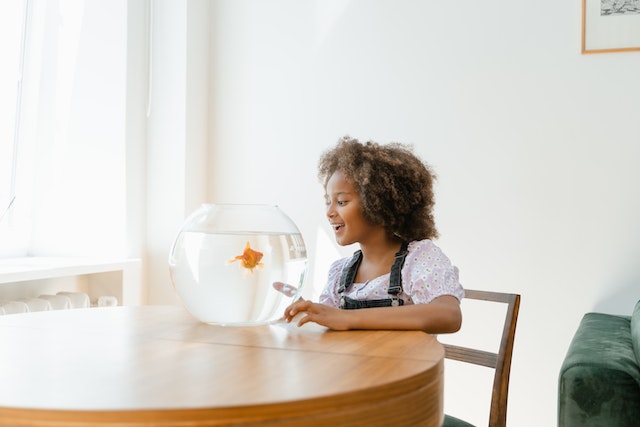Little do we understand that the fish we love watching as we wait for our turn in the dentist’s shop or our living room at home is meant to be out there at sea.
But we feed them, take care of them, and take all the trouble to give them a clean home; you may justify.
But then the real question is, are fish happy in tanks? Read on to see.
Are Fish Happy In Tanks?

Well, not if it is cramped. In such a case, the fish will be miserable and frustrated.
Fish love to swim, so if you keep them in a tank, ensure they have a lot of space to move about.
Even then, if fish were to be given a choice, they would be out in the ocean there, predators and all, rather than moving around in your spacious, safe, and friendly tank.
Do Fish Get Bored In Tanks?
If they are bored, they will show it to you as lethargy, where they will refuse to swim more often.
On the other hand, some will do the exact opposite. They will go about swimming frantically. Instead of going from one end to the other, they will go up and down the glass.
Then, some will sit in the corner without interacting with the other fish. If you see any of these, know it’s time to invest in their activity.
They may need a bigger swimming tank with more interesting decorative pieces. How about adding some more fish that they can use as a company?
Last, of all, you can interact with them too. They love you.
Recommended Reading: How to raise phosphate in reef tank?
Do Fish Know They Are In A Tank?
Well, they don’t exactly know what a tank is, but they do know that their space is limited from now on due to some human mischief.
You can console them by taking the proper care (which you shall see later), and they will be happy.
They can recognize faces, hear voices and play with you from inside the tank, but if given a choice, they would gratefully be out there in the water, exploring the world around them.
If they could tell you, they would. They don’t need your help in finding their next meal.
How To Tell If Fish Are Happy In New Tank?
While a fish cannot smile, she sure has her way of telling you that she is happy and content and that you are a good owner.
And you sure are curious by now, so here is how you will know.
- Active swimming: A happy fish swims and a pleased fish swims a lot. In addition to that, they will swim energetically and confidently. If a fish is inactive or lazy, on the other hand, it could be a sign that he is either sad or sick.
- Healthy appetite: If your fish is happy, she will eat. She will look at you excitedly each time you approach the tank, hoping to get some food. But be careful, as one of the fastest ways to kill a fish is to overfeed it.
- Bright coloration: Humans are not the only ones known to glow when they are happy. A fish can do that, too, appearing bright and vibrant in the aquarium because she is satisfied with you.
- Normal breathing: You must check his breathing occasionally to know if your fish is happy. Just make sure that he is constantly opening his mouth while he swims. This is a sign that he is breathing normally.
- Proper schooling behavior: No, this doesn’t mean you must start taking your fish to school. Their school is with the other fish, so all you need to do here is make sure that he is swimming with the other fish of his kind, for this is what you call proper schooling in a fish.
- Interaction with tank mates: When your fish are happy, they will get along with each other in the tank. In other words, what you are going to see is an active aquarium community without your babies hiding from each other in the tank.
- Resting and hiding appropriately: Like humans, fish, too, take the time to rest, which they will do by hiding among the rocks and other decorations you place around them. However, make sure that he is doing it appropriately. If he is doing it all day, then chances are that he is ill or stressed.
- No excessive aggression: When a fish is hungry, ill, or stressed, he can get aggressive. They will split their fins and even display some wounds, a sign of having fought with the other fish. They could send the other fish cowering under decorations and be extremely protective about their territory.
- Average growth and development: And then, finally, a happy fish is thriving. They will swim actively, eat what you give them and interact with the other fish of their species. In other words, they will live a healthy life physically and socially, and that is when you can conclude that your fish are happy.
- No signs of stress or illness: One of the first ways to observe this is to keep an eye on how he swims. A stressed-out fish swims in some odd patterns. They can move frantically, hitting rocks and crashing against the bottom of the tank. In addition to that, some of them can also change color and go completely pale.
Some others may show a lack of interest in anything you choose to feed them. If you don’t see the above, know your fish are delicate.
Do Fish Get Lonely?
The truth is that fish are as sensitive and intelligent as cats and dogs. They feel pain, get lonely, and often look for stimulation from other fish. They also feel fear, love, and pain. They have dreams and nightmares too.
Most of them love to swim in groups. When left alone for long, such fish will display signs of stress.
However, some fish like piranhas, betta, and Oscars are more territorial and can get aggressive when introduced to a new friend.
On the other hand, guppies, mollies, swordtails, and platies like to swim with their friends, so make sure that these are not left by themselves in the tank.
How Do I Make My Fish Happy In The Tank?
One of the main reasons why fish suffer in the tank is that only a few owners know how to care for them properly. If you are new to owning a fish tank, here are some ways to keep them happy in your home.
- Choose the right tank size:
Remember that each fish will need 24 inches of water to swim in. Now that is in the case of small fish (one inch). A bigger fish is going to need more. Now determine the size and number of fish you want and choose your tank accordingly.
- Maintain water quality:
In other words, do not buy an aquarium if you are not willing to take the trouble of changing the water on a frequent (weekly) basis, as this is very important for your fish. In addition, make sure that the water is mineral rich as this too is very important for a healthy fish.
- Provide proper filtration:
The truth is that fish tend to produce a lot of waste that can affect the water quality significantly. This makes it very important to provide proper filtration within the tank. This way, you will regularly be removing all the contaminants to make the aquarium clean and safe for your fish.
- Maintain a stable temperature:
For this, you must choose the right place, not one that will make the tank look better, but one that will give your fish the right temperature. Don’t place it near the window where it can get direct sunlight if you live in a region with extreme temperatures.
- Offer hiding spots and decorations:
No, decorations are not an obstruction but a source of comfort to your fish. Your shy ones at least have somewhere to hide when guests come to annoy them (and doesn’t that happen too often?). Just ensure you don’t decorate the tanks so much that your fish don’t have the required space to swim.
- Feed a balanced diet:
For this, it is essential to know what your fish needs, which can vary from fish to fish.
- Add fish gradually:
Make sure that the temperature is just right for your new fish. See, you always initially begin by introducing just two or three into the tank. This way, you won’t be affected by the tank’s nitrogen cycle, which could further affect your fish.
Now wait a week or two before introducing new fish (only if you have the space). Again, two or three is as far as you can go, and make sure that your fresh fish are compatible enough to get along with your old fish.
- Keep compatible tank mates:
Not all fish get along with each other, so if you don’t take the trouble to research more on this, you will see the more robust fish fighting with, the weaker fish.
A piranha, for one, can be highly territorial and is most likely not to get along with the rest of your fish. And that is how serious a case it is.
- Minimize stress and disturbances:
Don’t place the tank near your smart TV with the music blaring. Fish like to talk to each other. Only they don’t have a voice as loud as yours, so let’s be kind to them, shall we? This means you will say no to all kinds of noisy equipment as they will interfere with the communication between your fish.
- Monitor fish health:
You read all about how to tell if a fish is happy in a tank, didn’t you? Well, these are also some of the ways to monitor your fish’s health. In other words, a fish that will show you signs that he is happy is generally healthy.
So, now that you know the things that will make your fish happy, go ahead and do it, a step a day, till you are sure that all the fish swimming in your fish tank are healthy and happy.
Is It Cruel To Keep Fish In A Tank?
It depends. This is how it works. The fish you find in tanks are captured from the wild (the sea), and how? Some divers even throw a bit of cyanide to stun them out of their hiding, so they can quickly grab them into their nets.
Isn’t that kidnapping? Read on.
While some are raised in giant tubs, some others are bred in plastic bags, bowls, and cups of flower vases that significantly distort their view of reality.
Some breeders even inject dyes meant to ‘paint’ the fish and make them attractive.
Keeping fish in a tank is bad enough, but if you were to look at the process that leads to it, you would agree that it is downright cruel.
Must Read: What fish is not a bottom feeder?
What Do Fish Think About All Day?
Food. Just like us human beings. Fish think a lot about where and how to get their food. That doesn’t mean that they don’t have other concerns.
Did you know that fish can add and subtract, and some can even have incredible memories?
They have thoughts about you, too, like wondering why we love being out of the water and spending so much time going after them.
What Do Fish Do All Day In A Tank?
While for an onlooker, it looks like all they do is swim, a fish’s life is much more than that, like watching you,
While they spend fifty percent of their time sleeping, they still manage to stay active when they are awake, and they can’t be compared to us lazy human beings.
Out in the ocean, they would do much more, like finding food, escaping predators, and other things you are now taking care of.
Now that you have kept their hands free, they will spend their time communicating with each other, sometimes even mating, and then looking up at you for some food.
The Verdict: Are Fish Happy In Tanks?
Ultimately, the truth is that even the most spacious and well-maintained aquarium can’t be compared to the happiness a fish receives from the sea.
But then, we live in a world that loves decorating its homes with glass boxes containing fish from the sea.
So, if you’re going to treat them well, sigh… you can keep them. The fish will understand; hopefully, they will.
We are consoled by the fact that they are safe from their predators at sea. Don’t forget their daily meals.
Frequently Asked Questions
Now you know all about whether or not to get a tank for your fish, so before we sign off, here are a couple of FAQs.
Q1. Is it cruel to keep goldfish in a tank?
Ans: Yes, it is cruel and inhumane, much as you may justify that the entire world does it. These fish love swimming in ponds rather than in a tank at home to entertain guests. Understood?
Q2. Are fish tanks ethical?
Ans: Nope, but if you love watching and caring for the fish and want one in your home, you can make it ethical now that you read this article and know well what you should do.
Q3. Do Fish Get Tired Of Swimming?
Ans: Okay, bored is out of the question, and some of them move around even when they are sleeping. This is because, for a fish, swimming is as essential as breathing. The faster a fish swims, the better it is for him to breathe.



